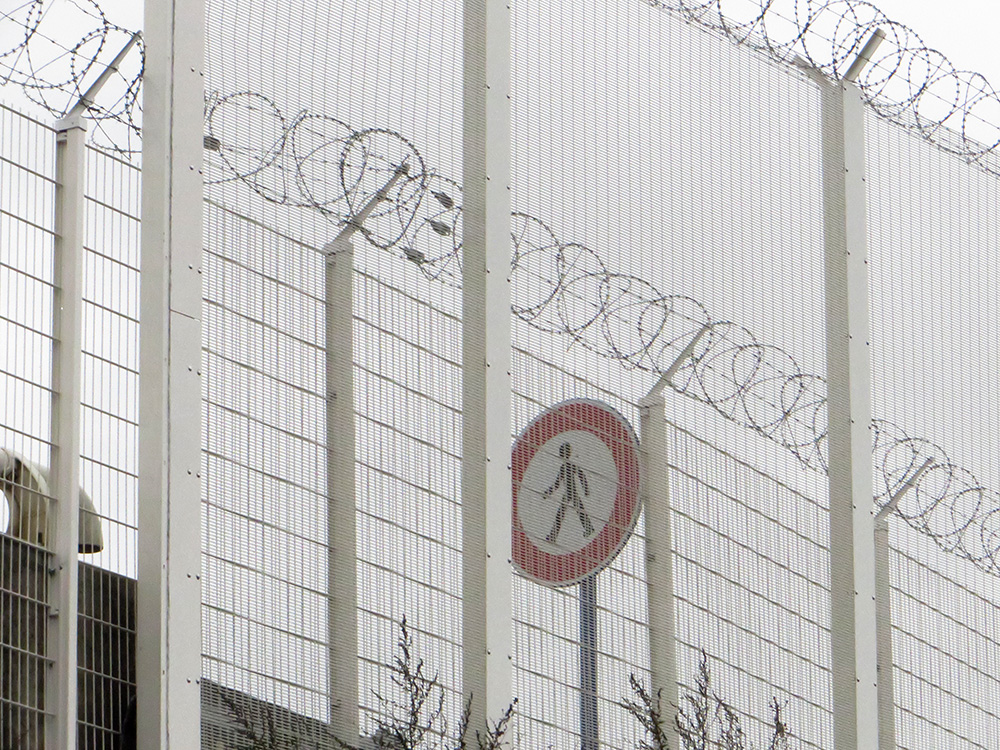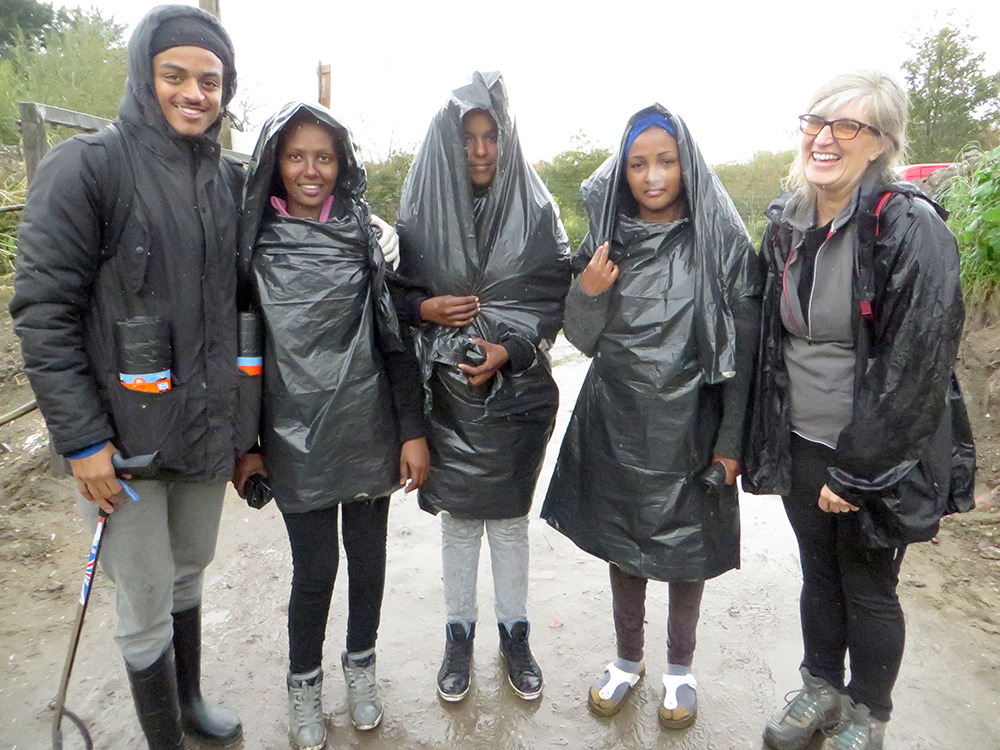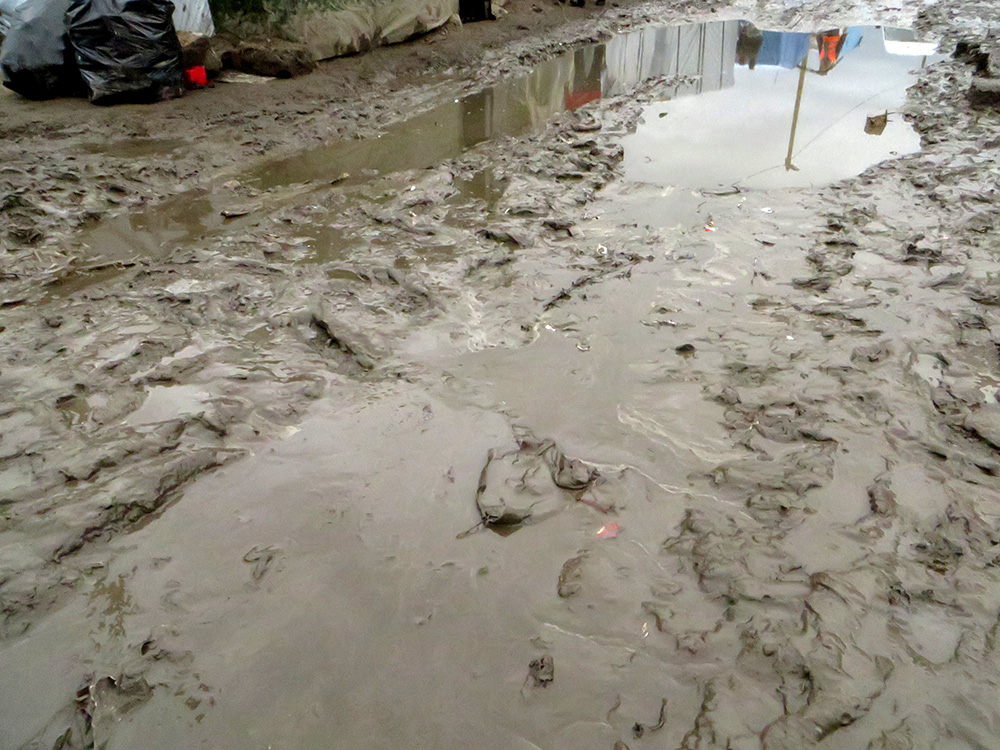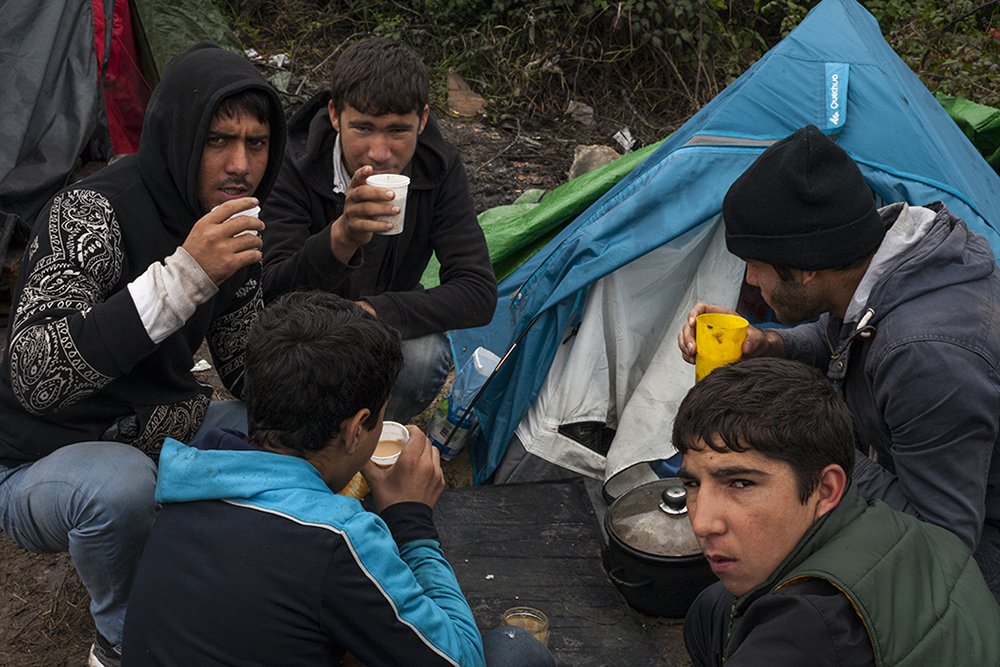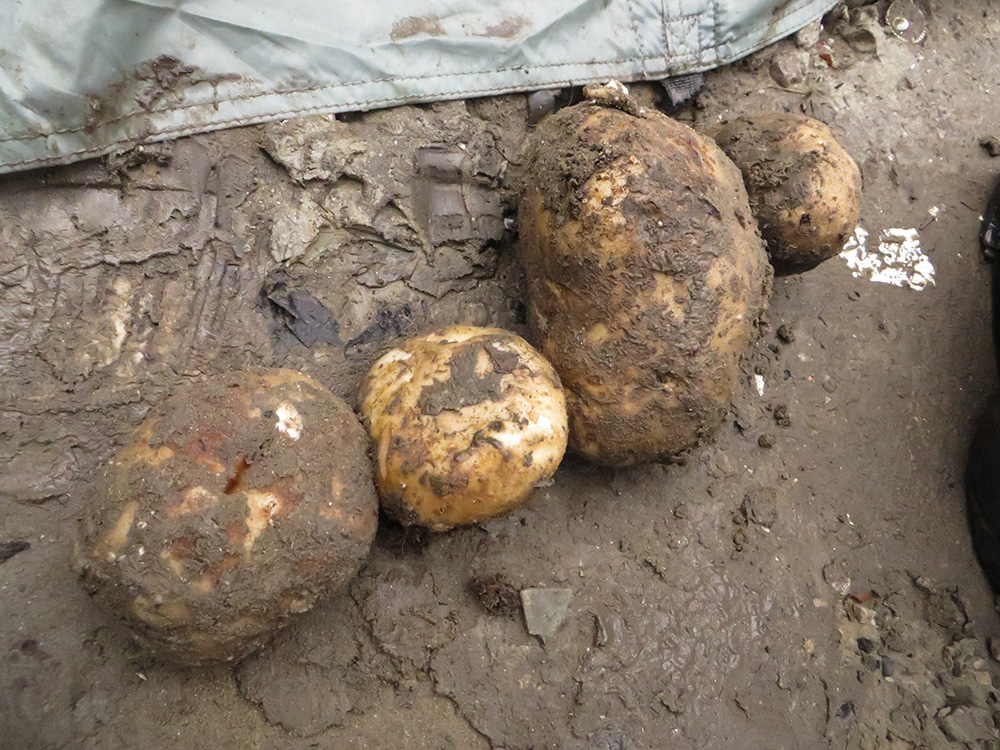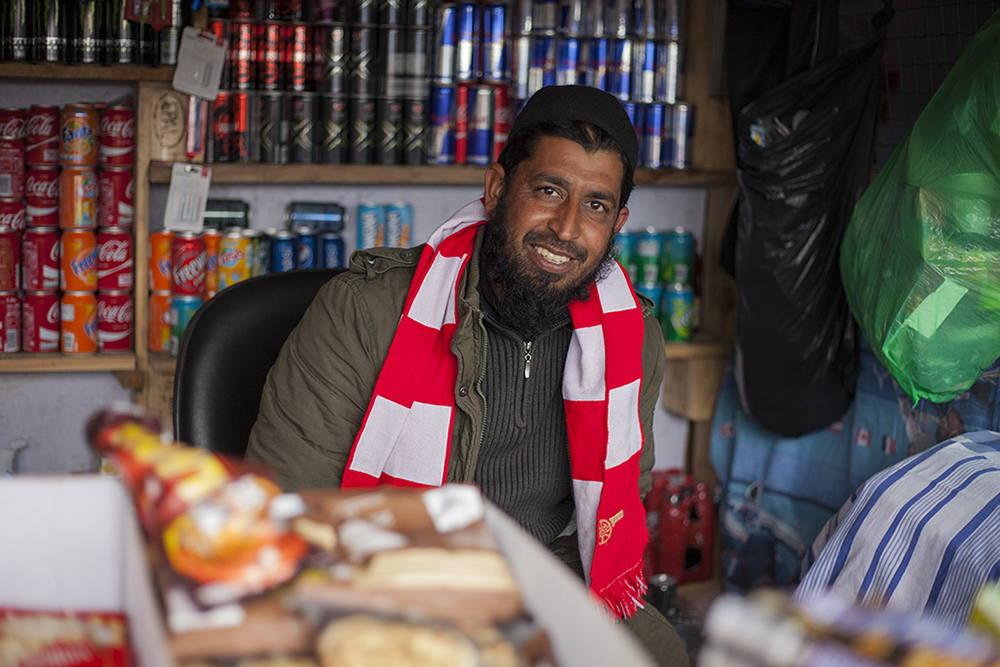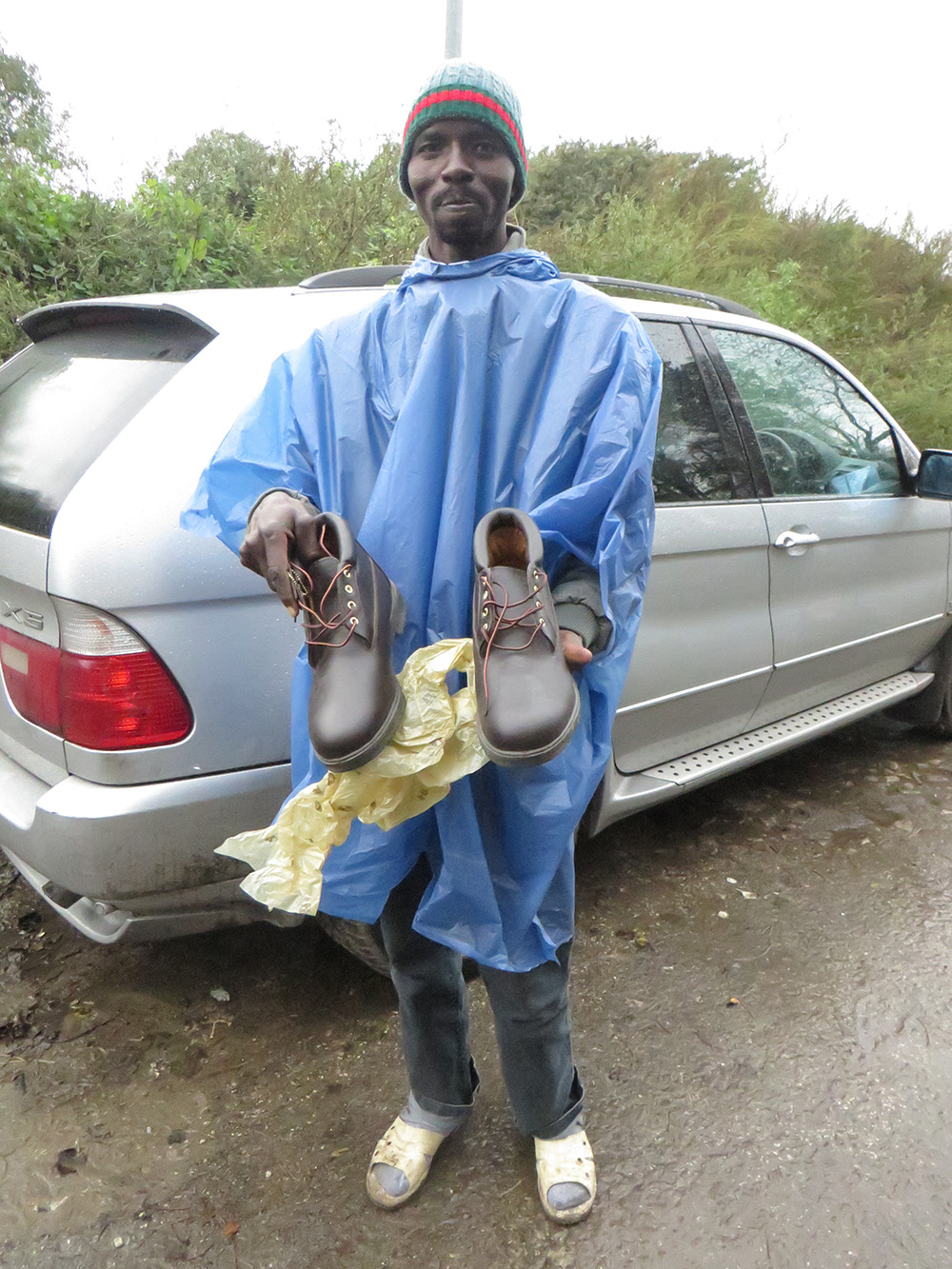Calais Jungle—a visit
Wednesday, 21 October 2015
The journey is delayed by a couple of hours due to ‘intruders’ in the tunnel. We can’t get in because they are in.
On the approaches and exits on both sides of the channel, the wet roads and grass banks are lined with multi-layered steel mesh fences, pristine cream curtains reaching up to their glinting fringe of coiled razor wire, beautiful, new sanitised borders within borders. They mask the world beyond the A16. We drive through Calais and out again, into a tidy little suburban street. At the bottom, a gate, a track, and when our five-o’clock-start eyes finally come up to it, it’s difficult to process the sight.
Parking up, a gaggle of young men jostle at the back of the car. This is a routine I see repeated over and again as cars arrive. Always British cars. We have nothing, we explain, we are clearing up. Elspeth opens the boot and shows the men our rolls of dustbin bags, rubber gloves, boots and stupid little litter pickers. They point to our boots. We need our boots. Heather gives a man her wellies and he clutches them to his chest. I pull out a pair of dry socks from my bag and pass them to him. They are my favourite light blue cotton ones with the grey heel and it’s touch and go whether I try grab them back off him. He nods gratitude. He is wearing plastic sandals in two inches of mud. It is pouring with rain.
We load up and walk into the camp. My rucksack is heavy. Three young East African women are caught in the downpour, and Heather fashions capes for them out of our bin bags. They are giggling, bright smiles and laughter. She makes them a bonnet each and I take their picture. They are happy to pose for their impromptu fashion parade, and we have made a difference with some refuse sacks.
All along the cratered landscape, off into infinity, little tents huddle in groups. As we walk up the track, the water deepens. We slosh past the leaning whiteboard church and a broken caravan, the smell of sewage at our feet. People scurry in the rain along the edge of the path, hopping from high spot to high spot in flip-flops, broken trainers, town shoes. I see a man wearing a pair of red suede slippers, soles flapping. I think of my socks again.
Men are building timber frames, hammering and sawing. Under shelter, men are crouching, smoking, scrolling on phone screens. At a water stand, men are washing their feet and heads. A very clean tube of toothpaste sits on a post, spattered with fresh rainfall.
Cobbled structures of damp blankets and tarpaulin hold gloomy spaces, men idly sitting. Men walking, staring. Almost no one is talking.
We reach the church caravan and the volunteers’ field and Clare gives us our instructions. She’s wearing a large grubby yellow parka with a huge hood. We walk down to the crossroads where, on the concrete square, an enormous empty white skip stands like some shrine to litter picking. It’s the size of a swimming pool. Down a slippery path, on a sodden brown art deco sofa, a pile of garden forks, bin bags, gloves and more stupid little litter pickers.
Our job is to empty the pits between the groups of tents. People dig out earth and place it around the bases of the tents to help waterproof them and to weigh them down in the wind. Once dug out, the pits are soon filled with rubbish. I join a group of three or four others already at work. They have little plastic hoops to keep their bags open, and they are stooping down, lifting individual pieces of garbage with a litter picker and placing them in their bags. One of them is gagging and they have placed scarves over their faces to shield them from the smell. This, I can’t help thinking, is going to take forever. I take off my raincoat, step into the pit, and begin shovelling handfuls with my gloved hands. I shudder as the smell meets my face. My boots are ankle deep in a filthy liquid the consistency of gravy. It has bright yellow kernels of corn floating in it. “Ew”, says the gagging girl, “vomit-soup”—and we all laugh, coughing and flinching at the stink. Gratefully, the others hold their bags out for me to fill. The stench is spectacular. “How can you do that?” one of them asks, “how come you’re not throwing up?” I explain: “tonight I’ll have a hot shower and drink expensive whisky with my cats.” Now on a roll, and to emphasise my own privilege, I add “my cats have medical insurance”. A sixth-former pulls up with an empty wheelbarrow to collect our filled bags. “What’s wrong with your cats?” he asks.
The pit is full of rusting tin cans, rotting bread and rice, potatoes and bags of pasta, all swimming in the slimy, fetid vomit-soup. The potatoes have rooted in the bottom of the pit, sending up uncertain yellow-green lanky stalks. There are toy cars, toothbrushes, worthless tiny coins; packaging, clothing and wrapped boiled sweets. I find an aluminium shaving bowl and think to keep it for a moment. My bag-holder rattles her bag expectantly so I toss it in.
There’s a lot of uneaten food. No one goes hungry here. There are some funny donations, though. Boil-in-the-bag fish fillets. Tins of mackerel. Chinese-style noodles. These go uneaten, along with the tuna, rice pudding and instant breakfast porridge. People here eat chickpeas and rice. A little chicken, and fresh vegetables too, and there are biscuits and cakes. No one eats the cornflakes, since there’s no milk and when there is it makes people sick. Elspeth tells me that someone dropped in a pair of high-heeled shoes at the collection centre in Hackney because “they might be good for a job interview.” Later, in the car home, she tells me one of the men she met walks into Calais every night to a restaurant for a meal. Some people have money: there are phones and there are little shops. But no one can move from the camp. Unless, of course, they strap themselves to the underside of a train or conceal themselves in a lorry. I notice that all the young men wear dark clothing.
There are almost no women or children and very few older men. The camp is home overwhelmingly to young men. They are exhausted and wander along the paths in a waking daze. Occasionally we are asked for shoes, but mostly people simply watch us clearing up the rotting garbage. We clear the pit, and at the bottom I dig up a forkful of big fresh potatoes, grown strong in the slurry.
Into the afternoon, the skip starts to fill. Vans draw up; a group of twenty British South Asian men from Sheffield in brand new hi-viz jackets ask me where their donations should go. They have blankets and cooking pots; tents, food and clothing. Their clean white trainers sink into the mire. I walk down to the auberge, where the Médecins sans Frontières volunteers are sorting though a truckload of sleeping bags. My new charges snake behind me, hopping from brick to rock to bank like some fluorescent conga. I translate between the two groups, the French asking where they’re parked; the British guys listening intently. I make decisions; we move vans; suddenly I am in charge of something I barely comprehend. This, I learn, is the fluid process that keeps the chaos in check and by which everything happens. Several young men wade over to shake my hand, their new bedding tucked under one arm. Evidently I am responsible for the supplies and they are very grateful. I consider asking if anyone’s seen a pair of light blue cotton socks.
Down towards the motorway, before the line of portaloos, I come across a tidy, well-stocked grocery. It’s one of several shops along the main track, together with a couple of rudimentary restaurants, some with generators purring and spluttering. The shopkeeper smiles; he displays madeleines, biscuits and chocolate bars behind a grille. Around his neck hangs a red & white striped scarf with a picture of a canon embroidered in golden thread. I point to it and grin: “Arsenal”. He smiles blankly. “Gooner. Arsenal. Your scarf,” I speak more slowly “Tony Adams, Highbury. The flat back four.” Still nothing. I point again and now I mime a kick, followed by a cheer. He reaches under the counter and retrieves a packet of paracetamol. “No”, I say, now pointing to the mud and then forming an imaginary sphere with my hands. “Foot. Ball.” He begins to open the packet. This is becoming trickier than I had imagined. “Aha!” I cry, snatching at a eureka moment, and begin singing the Match of the Day theme, reasoning that even if he’s not familiar with soccer he must have heard of the BBC. A small crowd gathers behind me and I sense a shift of mood. “Des Lynham?” I ask, a little desperately. His face suddenly lights up. He pushes two Snickers bars through the grill and says “one euro”.
I trudge back to my wheelbarrow. Large numbers of men mill around. Mid-afternoon, they emerge from damp and broken sleep. They gather themselves, they eat, and then in early evening they set off to the tunnels. A few get through some nights; almost always they fail; but every night they return to the tunnels in darkness and try again. The previous night, five had been killed. Almost no one plans to be here for more than a few days, although many stay for much longer than that. Some carry injuries. One young guy is sitting, nursing a broken arm. He tells me he fell from a train. He has no painkillers and he cannot sleep. He looks distraught.
Later, as we pass back through passport control, we are met by a policeman rather than an immigration officer. He is quite interested in our car and spends a little while checking our faces against our passport photos. I ask him whether they ever uncover any smuggled people in cars. He is perfectly candid. “Every day,” he says.

